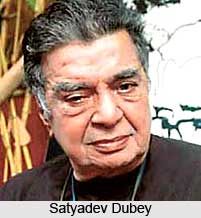 Satyadev Dubey was born in 1936 in Bilaspur, Madhya Pradesh. He is a prominent actor and director in Marathi English, Hindi and Gujarati theatre as well. He was a famous Indian playwright, screenwriter and film and theatre actor as well. He was awarded the Sangeet Natak Akademi Award in 1971.
Satyadev Dubey was born in 1936 in Bilaspur, Madhya Pradesh. He is a prominent actor and director in Marathi English, Hindi and Gujarati theatre as well. He was a famous Indian playwright, screenwriter and film and theatre actor as well. He was awarded the Sangeet Natak Akademi Award in 1971.
After completing his childhood Satyadev Dubey moved to Bombay, completed an MA in English, and took theatre as passion while in college. Influenced by Marathi theatre personalities like Parshwanath Altekar and P. D. Shenoy, he was trained for two years at the Theatre Unit School of Dramatic Arts, and started directing in 1956. A daring yet sensitive actor-director, he stresses the spoken part of acting and devotes a lot of time and energy to memorizing the lines and speaking them with correct diction and intonation. Usually he leaves his actors to develop their characters in their own ways, but his production is preplanned and well executed. He normally worked with limited resources and, as such, never used heavy sets or expensive musical support. Indeed, one could criticize his limitations as the frequently bare stage and over-reliance on recorded film songs. His main strengths were selection of powerful texts and perfect casting of performers like Amrish Puri, Sunila Pradhan, Sulabha Deshpande, Amol Palekar, Naseeruddin Shah, and Ratna Pathak Shah.
Satyadev Dubey directed all sorts of plays, serious and light, realistic and poetic, but specializing in symbolic contemporary Indian drama. He became famous for Hindi productions of Dharamvir Bharati`s Andhayug i.e. `Blind Age` in 1962, Mohan Rakesh`s Ashadh ka ek din i.e. `One Day in Ashadha` in 1964 and Adhe-adhure in Hindi in 1969 and in Marathi in 1970, Girish Karnad`s Yayati (Hindi 1967, Marathi 1970) and Hayavadan in 1972, Badal Sircar`s Evam Indrajit in 1970 and Pagla ghoda i.e. `Mad Horse` in 1971 also in Marathi. Some of the others that are in the list can be mentioned as Elkunchwar`s Garbo in l974, Arakta kshan i.e. `Blood-red Moment` in 1981, from Raktapushp, Virasat i.e. `Inheritance` in 1985, from Wada chirebandi, and Pratibimb i.e. Reflection in 1987, also in Marathi. He is remembered for acting Aswatthama in Andhayug, Indrajit in Evam Indrajit, and Danthal Babu in Pratibimb.that was his favourite plays. He also directed Sircar`s Vallabhpurchi dantakatba i.e. `Vallabhpur`s Fairy Tale` in 1969, from Ballabhpurer rupkatha and Elkunchwar`s Raktapushp i.e. `Flower of Blood` in 1981 in Marathi, Tendulkar`s Sakharam Binder in 1973 and Sitanshu Yashashchandrasvl manas Madrasi lage chhe i.e. `This Man Looks Madrasi` in 1978 in Gujarati, and Shaw`s Don Juan in Hell in 1983 and Village Wooing in 1986 in English.
Satyadev Dubey has made two short films `Aparichay ke Vindhachal` in 1965 and `Tongue In Cheek` in 1968. Dubey`s original plays include Sambhog se sanyas tak i.e. `From Sex to Sanyasi-state` in 1975, Apratyashit i.e. `Unexpected` in 1978, and fourteen-beat Tala in 1982. He has also translated and adapted from English, Marathi, and Gujarati, scripted scenarios and dialogue for movies, written poetry, and regularly contributed articles on theatre to magazines. In 1971, he directed the film version of Tendulkar`s Shantata! Court chain ahe i.e. `Silence! The Court is in Session` in 1967 was a milestone in new wave Marathi cinema. His acting can be seen to advantage on screen as the helpful priest in Shyam Benegal`s Nishant i.e. `Night`s End` in 1975 and one of the villains in Dilip Chitre`s Godarn i.e. `Warehouse` in 1983.
Satyadev Dubey won the 1978 National Film Award for Best Screenplay for Shyam Benegal`s Bhumika and 1980 Filmfare Best Dialogue Award for Junoon.




